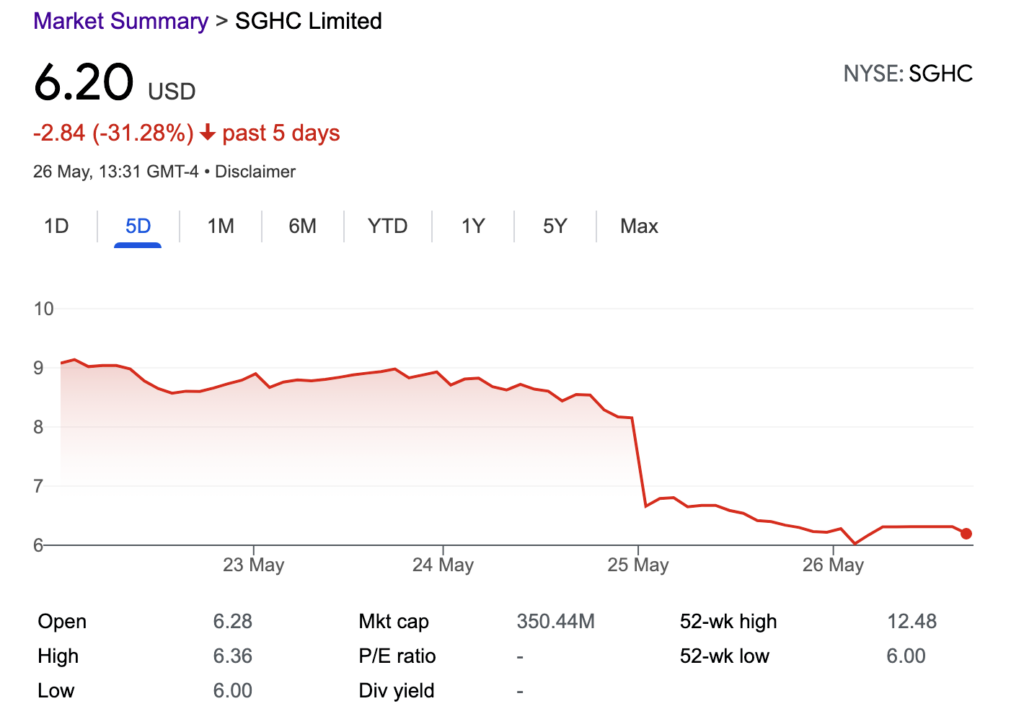It’s fair to say the markets’ reaction to Super Group’s announcement that it would be “tough to meet or exceed 2022 revenue guidance” was bad.
Its shares were down 27% on the day and listening to the investor call, it was clear there was surprise and, even, a tinge of anger in some of the questions the analysts asked of the group’s senior management.

The company said regulatory changes in Germany, Austria and the Netherlands had led to a €4m drop in Q1 revenues and this was why it was reviewing its full-year guidance.
A quick rundown of its corporate timeline however shows that the parent company of the Betway betting and Spin casino brands has gone from listing in February, to forecasting full year revenues of $1.4bn and EBITDA of $354m in April, to rowing back on those numbers barely six weeks later.
As Wagers.com Earnings +More reported on Wednesday, asked what had changed and if there would be “a little miss on 2022 revenues or a big step down”, it said hold levels in March were hit by unfavorable results and “it can take a while to catch up”. It said it would update the markets when it reports second quarter results in August.
- “For the rest of the year, if we carry on as we’ve seen in April and May the top line is not looking scary, the issue is catching up on EBITDA bottom line,” the group said. “Six to eight weeks ago it was harder to make a call on where exactly it would go but now we’re in a better position to say.”
“Tried and tested”
The turnaround makes one wonder what’s going on behind the scenes at Super Group. This was compounded by the fact that management’s comments gave no clue as to how it would rectify the issues.
COO Richard Hasson said the business is “made up of numerous different markets that are all at different stages, so it’s very much a balancing act between finding how best to invest for the long term and balancing that with short term profitability”.
Therefore, it “made sense” to look at the forecasts. “The key point is that the model has been tried and tested over many years, and is very much intact,” he added. The point of having operated for many years and knowing how to make use of that experience was made repeatedly throughout the call.
Meanwhile, CEO Neal Menashe said: “The world today is a very different world than it was 12 months ago”, but Super Group’s broad international reach also gives it many opportunities.
- “We know how to adjust levers that are in our control and if we’re in certain markets where there are headwinds. By the time of the re-forecast in Q2 we will have adjusted those levers.”
Canadian priority
Looking at the geographical breakdown, Super Group’s revenues in Africa and the Middle East were up 57% to €79.2m; Asia-Pacific was up 36% to €55.3m, Europe was down 20% to €30.2m and North America up 1% to €150.4m.
In other words, all its growth currently comes from (in the main) unregulated markets in Africa and Asia-Pacific, while Europe’s more mature and generally more regulated countries are down 20%. North America, which is really Canada, barely grew.
There has been much talk, including on these pages, about whether big US brands like DraftKings will make their mark on Ontario’s online sports betting scene because the province, and more generally Canada, was and still is one of the biggest gray markets in the world.
Bet365 is widely considered to be the market leader there and the likes of Super Group’s Betway, bwin or Sports Interaction are also believed to have strong market shares.
But equally, whenever the Alcohol and Gaming Commision of Ontario publishes the first set of revenues from the province there will be much scrutiny about whether Betway acquires, maintains or loses share.
If it does it will show that it’s capable of growing in a regulated environment and if it doesn’t, industry observers will draw their own conclusions.
As Wagers reported in April, North America/Canada made up nearly half the group’s revenues in 2021 at around €594m, with its icasino brand Spin generating €463m of that total.
Those figures make it even harder to understand why Super Group has not obtained regulatory approval in Ontario to launch on day one of the province being regulated on April 4 and its answers to questions about its plans for Ontario also felt unsatisfactory.
Lack of clarity
It said it had been certified for sports betting and was waiting to shortly switch over to its regulated offering. It added that it expects to be certified for online casino in the province and it might launch later, or at the same time as its betting offering, but wasn’t sure.
The lack of clarity from Super Group is difficult to understand. Maybe it is related to the fact that it was one of the last major operators to list via a SPAC and didn’t consider all the potential problems that could arise from those financial vehicles as opposed to listing via a traditional IPO.
In addition, while the listing happened in the US, most of Super Group’s revenues and profits don’t, and are unlikely to, come from that market. As a result, stateside investors might be looking on these results and wondering what they have signed up to.
No doubt industry analysts will be holding numerous meetings with Super Group management between now and August.
